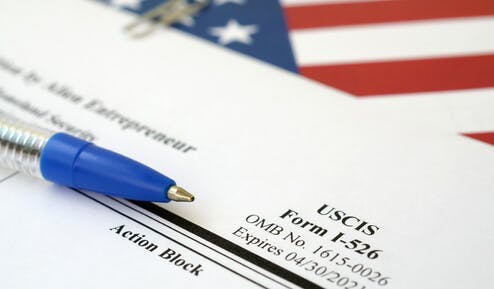Immigration lawyer Matt Galati says that current processing times for I-829’s are “illegal,” and along with COVID-19 agency appointment closures, can result in some investor families having no evidence of lawful status. This can impact employment, travel, and many state benefits. Galati says a mandamus lawsuit may be the only recourse.Applicants waiting for more than 18 months for adjudication need an INFOPASS stamp to show ongoing status. But the pandemic has resulted in a suspension of INFOPASS appointments — leaving some investor families without evidence of lawful status. This can can be “catastrophic” to their lives.
I-829 should be near the end of a long road — but it isn’t
Galati uses the metaphor — a long road, for the EB-5 process. And he says the end should be in sight when an immigrant investor files an I-829 petition to remove conditions of their permanent residency. But that road forward is not as short or smooth as it used to be, due to lengthy USCIS processing times and new and dangerous twists caused by the pandemic.
USCIS processing times are ‘illegal’
First, Galati points out that the agency is actually in contravention of the law with its processing time for I-829 applications. The governing regulation mandates that USCIS “must either waive the requirement for an interview and adjudicate the petition or arrange for an interview within 90 days of the date on which the petition was properly filed.” Compare that with current published I-829 processing times of 22-28.5 months. Galati pulls no punches and calls this “illegal.”
Losing evidence of lawful status — and the problems it can bring
Beyond its actual legality, this delay has practical implications as well; investors and their families need proof of lawful permanent residency, usually achieved with an I-829 Receipt Notice. As processing times increased substantially, USCIS increased such receipt notices to be valid for 18 months. But with current processing times taking longer than 18 months, that presents a problem. Galati tells us that new receipt notices are not usually issued.The solution has been for petitioners to make an INFOPASS appointment to receive a stamp in their passport that proves ongoing lawful status. But the pandemic has resulted in the suspension of such appointments except in emergency circumstances. Thus, these families can be left without having evidence of lawful status.This can have some very real and distressing impacts and present problems with employment, travel outside the country, and applying for many state benefits. Galati states bluntly, “USCIS’ lack of productivity is hurting families.”
The answer can be found in the courts
While Galati laments that there is “no clear administrative solution” to this problem, he does offer an answer: Mandamus lawsuits. Citing the Administrative Procedures Act, he explains that USCIS must adjudicate petitions within a reasonable period of time. Further, the Supreme Court has declared that when an agency has been mandated a certain time period to perform a duty, a court can compel them to do so.Galati opines that we should see more of these mandamus lawsuits compelling USCIS to adjudicate I-829 petitions within reasonable timelines — “until the agency gets its act together.”Read Galati’s blog “COVID-19 Exacerbates Form I-829 Processing Pain for EB-5 Investors, Lawsuits Growing in Popularity”



